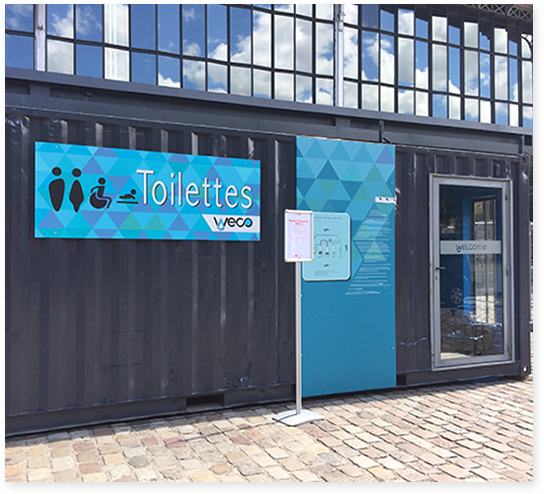While 4.2 billion people in the world do not have access to drinking water, 7 billion m3 of this common good are wasted for toilet flushing every year, including 3,171 litters every second in France. This is why the UN created the Sustainable Development Goals (SDGs), including number 6, which aims to guarantee access to water and sanitation for everyone. And the UN’s World Toilet Day on November 19 each year, created almost 10 years ago on the initiative of Jack Sim, the founder and President of the World Toilet Organization, is an opportunity to talk about the crucial subjects and even lifelines related to water and sanitation.
France and in general Europe experienced this summer and continues to experience since spring an unprecedented drought, which in autumn and spring results in a shortage of water linked to a lack of precipitation. The mere sight of the rivers at the lowest is enough to realize this, even in the middle of November. Switzerland, a country renowned for its lakes, snow-capped mountains, rivers and green meadows, has also experienced unprecedented drought. Last year, it was North America and particularly Canada that suffered from a severe drought. In addition to the proliferation of droughts, low rainfall, it should be noted that 61% of the water that falls evaporates. Everyone is cruelly aware of water, which becomes a precious commodity for humanity, and already too rare if we do not preserve it, knowing that it is the raw material we need most to live.
So, do we continue to waste drinking water for the toilets without reusing it, do we completely deprive ourselves of water in the toilets with the hygienic problems that this can create? in cities (remember that sewer systems and flush toilets were invented in London to promote hygiene and put an end to epidemics like cholera in the 19th century, which killed largely with the urbanization), do we continue to favor chemical solutions that are very harmful to health and the environment, such as the chemical toilets used on construction sites and at events, or do we choose innovative, sustainable and hygienic solutions?
It is on this idea and objective of preserving water resources that we could no longer continue to waste drinking water in the toilets and that it had to be reused, that WeCo SAS was created in 2014 by 8 shareholders from France, Germany, Dubai and South Korea.
In fact, flush-connected toilets bring drinking water from the network, consume 6 to 10 litters per flush, plus the volumes for the automatic washing of public toilet cabins that are even larger, and evacuate this wastewater into the networks, to finally arrive and be treated in a treatment plant, without further reuse.
Because France is one of the countries that reuses its wastewater the least, with only 0.6% water reuse when Spain reuses 14%, and Singapore 80% of wastewater treated.
This is why the European Union is in the process of building a whole body of directives and regulations to promote, and even oblige, the reuse of wastewater. First of all, with the European regulation of June 2020 on the reuse of wastewater, which aims to promote “reuse” by harmonizing the rules of application at European level; it aims to ensure that treated wastewater is more widely reused in order to limit the use of water bodies and groundwater. Falling groundwater levels, notably due to urban development, is one of the main threats to the EU’s aquatic environment.
Stated objective: to go from 1.7 billion cubic meters of reuse per year to 6.6 billion, which would make it possible to reduce water stress by 5% at EU level by 2025. Then, the very recent Commission proposal suggests toughening the directive on urban wastewater in order to fight against pollution of surface water, recover sludge by reusing it and extend these measures on wastewater to municipalities with 1,000 inhabitants.
WeCo, which became an impact company in 2021 (see the mapping of start-ups to Impact by France Digitale and BPI), has developed the first so-called “deeptech” technology for the treatment and innovative reuse of black water from toilets allowing the recycling of waste water. to reduce water consumption for toilets by 97%.
WeCo’s Water Recycling Eco Toilets (WRET™) are the only toilets in the world that onsite treat and recycle wastewater into treated water for closed-loop flushing. They are the only ones to combine the advantages of conventional toilets: flushing and hygiene of connected toilets, with those of chemical and dry toilets: autonomy and mobility. They are autonomous and therefore mobile, easily installed and moved to all places where public toilets are needed.
This innovation has been recognized by numerous innovation awards around the world: Gates Foundation award, European Commission Seal of Excellence, Water Europe innovation award, European Innovation Centre Climate KIC award, Future Investment Project (PIA) of the General Secretariat for French Investment operated by ADEME.
In conclusion, WeCo does not just celebrate World Toilet Day every November 19th. It works with the entire team and its partners to develop every day the toilets of the future: innovative, ecological, mobile and stylish (see the WeCo Installations Book in the “Our customers” section).
To find out more about WeCo toilets, watch the Arte report on the toilets of the future: Rebroadcast on Arte TV on 26.11.2022 at 11:15 p.m. and summary on :
https://www.youtube.com/watch?v=YVPkYOzEAvs
Where to find the first WeCo public toilets: at the Cité du Design in St Etienne, at the Grande Borne market in Grigny, on the Mail F. Mitterrand in Rennes, at the Rabelais college in Blois, at the Ventrus restaurant in La Villette, Francioli company HQ.
Contact: contact@weco-toilet.com

